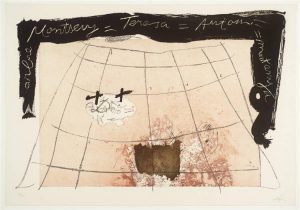Genesis 22:1-14
This text is used for the Lectionary Year A on July 2, 2017.
 “God Will Provide”
“God Will Provide”
Life is a promising and dangerous adventure. The stakes are high. Participation is not optional. Everyone has to decide and act on the decisions made. We all have to figure it out. So we ask, “God, how can we successfully live out this adventure of life on earth?”. And it is as though God says, “Glad you asked. Because I will provide what you need when you need it.” Patience is trusting in God’s timing. And a life well lived requires well-placed trust.
The drama of Abraham & Isaac at Mt. Moriah revealed this drama in a troubling fashion. Why would God, whom we believe is loving, good, and trustworthy – ask for the human sacrifice of Abraham’s beloved son? Or for that matter any human sacrifice? What we find is that nowhere else in Scripture does God ask anyone else to offer a human sacrifice. So the bigness of this passage includes a major teaching that shaped the rest of Scripture and informs our life today. God’s goodness is what we can trust in when the options of our circumstances don’t indicate that we have any good options. Let’s pay attention to the story and let the meaning show us the way forward.
Spiritual Map Making
Abraham & Sarah and Isaac were spiritual mapmakers. That is, they followed God’s leadership into faith territory not previously understood or traveled. By their obedience to God’s call, and by God’s grace which forgave their failures – they became the leaders in God’s faith movement. (Known as Patriarchs and Matriarch of faith.) Their story is frequently referred to in the Old and New Testaments. They define how to live the meaning of faith as defined in Hebrews 11:1, “Faith is the substance of things hoped for and the evidence of things not seen.’
To map this journey, they were confronted with circumstances that they would need to transverse in ways that others could follow. Including some trails that needed to be closed so tightly that no one else would consider them as God provided options. This required a teleological suspension of the normal. That is because of what needed to be accomplished, a seeming wrong choice is fully examined as being a possible right choice in order for everyone to see why it is a wrong choice for all time.
God did not want Isaac as a human sacrifice. God wanted to be worshiped with praise and righteousness. Later the Hebrew prophets would redirect worshippers’ attention into seeing the sacrifice that God wanted was an obedient life, not the flow of human or animal blood. (Hebrews 6:6; Micah 6:8) This pattern was clearly established in the story of Genesis 22:1-14.
The Test
God does not tempt us, but He will test us. The difference is in purpose and means. Temptation leads us into sin, into cheapening ourselves and others. Tests lead us into faithfulness. (Exodus 25:25; Psalm 66:10; Matthew 6:12; James 1:12-13) Through tests, God forges our character and faith skills so we will be prepared for challenges which are ahead of us. So God called out to Abraham, and reported in, “Here I am.” He heard his instructions. We gasp in response. But there it is. The drama was set.
Early the next morning Abraham with Isaac and two servants “set out for the place God had told him about.” Mt. Moriah is where Abraham was to go. Later it would be the site where Solomon would build the first Temple, and it is where Temple remnants remain to this day. After a three-day journey, Abraham saw the location and said to the servants. “Stay here… we will worship and then we will come back to you.” Isaac carried the wood. Abraham carried his knife and “fire.” Isaac noticed the critical absence of the sacrifice that was to be offered.
Poignant words were spoken. Isaac spoke up. “Father.” Abraham tenderly responded, “Yes, my son.” Isaac named what was obvious, “The fire and wood are here but where is the lamb for the burnt offering?” Hearing the real question behind Isaac’s words, Abraham spoke, “God himself will provide the lamb for the burnt offering my son.” They then walked on together. On location, the seeming offering of Isaac, whom Abraham dearly loved, was set to happen. With grimacing description, the scene unfolds. Isaac is bound, laying on the altar. Abraham raises his knife to slay his son.
“Then the angel of the Lord called out to him from heaven,” like when God heard Ishmael’s cry in 21:17. God responded to this crisis. What would God say? He called him out with a double intensive, “Abraham. Abraham.” Just as this adventure began, Abraham responded faithfully with, “Here I am.” God highlighted the divine takeaway, “Do not lay a hand on the boy. Do not do anything to him.” This son does not need to be sacrificed. Because the real purpose has been revealed to Abraham and humanity. He had shown that God who is ultimate, demands and deserves ultimate trust. The “fear” Abraham offered on the altar was ultimate reverence and awe.
So God provided. Having made what Soren Kierkegaard called the “leap of faith,” Abraham’s could then “see the ram caught by its horns in the thicket.” Together, father and son made their sacrifice at the place that would be called, “The Lord will provide.”
When you offer God your ultimate trust, He will provide.
 D. Leslie Hollon
D. Leslie Hollon
Senior Pastor
Trinity Baptist Church, San Antonio, Texas
lhollon@trinitybaptist.org
Tags: promise, sacrifice, temptation, testing, fear, provision
